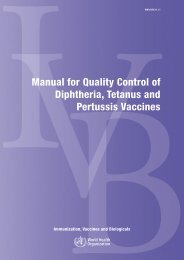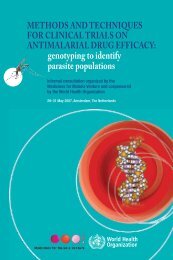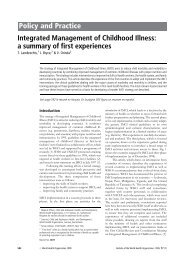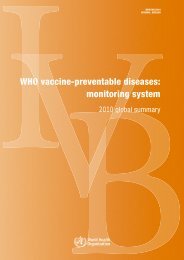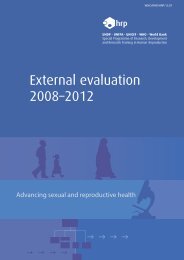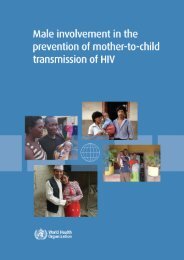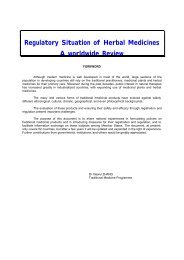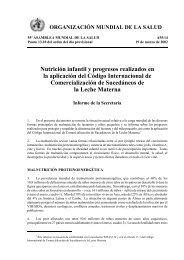IPDE - Extranet Systems - World Health Organization
IPDE - Extranet Systems - World Health Organization
IPDE - Extranet Systems - World Health Organization
You also want an ePaper? Increase the reach of your titles
YUMPU automatically turns print PDFs into web optimized ePapers that Google loves.
117 Scope of the <strong>IPDE</strong><br />
a behaviour should be present before it can be considered a personality<br />
trait. ICD-10 states that it should be stable and of long duration.<br />
Therefore, we have adopted the somewhat conservative convention that<br />
it should exist for a span of at least five years. Consideration was given to<br />
a three-year requirement, but it was decided that might too frequently<br />
lead to confounding episodic mental illnesses or responses to unusual or<br />
special life situations with the more enduring behaviour associated with<br />
personality. Some may feel this is too exacting. especially when applied<br />
to adolescents or young adults. Si<br />
users of the <strong>IPDE</strong> will differ in<br />
their predilection for making personality disorder diagnoses in adolescents,<br />
those who prefer a three-year requirement may adopt it for that<br />
age group. They should specify, however, that they have departed from<br />
the standard instructions. The use of anything less than a five-year timeframe<br />
with subjects over 20 years of age is discouraged.<br />
ICDlO dates the onset of the first manifestations of a personality disorder<br />
to late childhood or adolescence. For that reason we have taken the<br />
somewhat arbitrary position, that the requirements for at least one criterion<br />
of a disorder must have been fulfilled prior to age 25, before that<br />
pdcular disorder can be diagnosed. Age 25 years rather than an earlier<br />
age was selected to allow more informed and accurate judgements about<br />
many of the adult-oriented personality disorder criteria.<br />
Clinical tradition notwithstanding, it is possible that personality transformations<br />
may occur in midlife or old age, and that a hue personality<br />
disorder may emerge de novo at that time. In the absence of empirical<br />
data, rather than encourage premature closure on the subject we have<br />
made pmvision in the <strong>IPDE</strong> for an optional late onset diagnosis. We<br />
have also provided the option of making a past diagnosis in someone<br />
who previously met the requirements, but has not done so during the past<br />
year(l2 months).<br />
Scope of the <strong>IPDE</strong><br />
The IF'DE is not designed to survey the entire realm of personality. Its<br />
purpose is to identify those traits and behaviours that are relevant to an<br />
assessment of the criteria for personality disorders in the ICD-10 and<br />
DSM-IV classification systems. It neglects many neutral, positive, and<br />
adaptive traits, because they are irrelevant to a personality disorder<br />
assessment. It also does not cover other mental disodm, because there<br />
are instruments available for them. We recommend their use prior to the<br />
IF'DE, to provide the examiner with clinical and historical information




